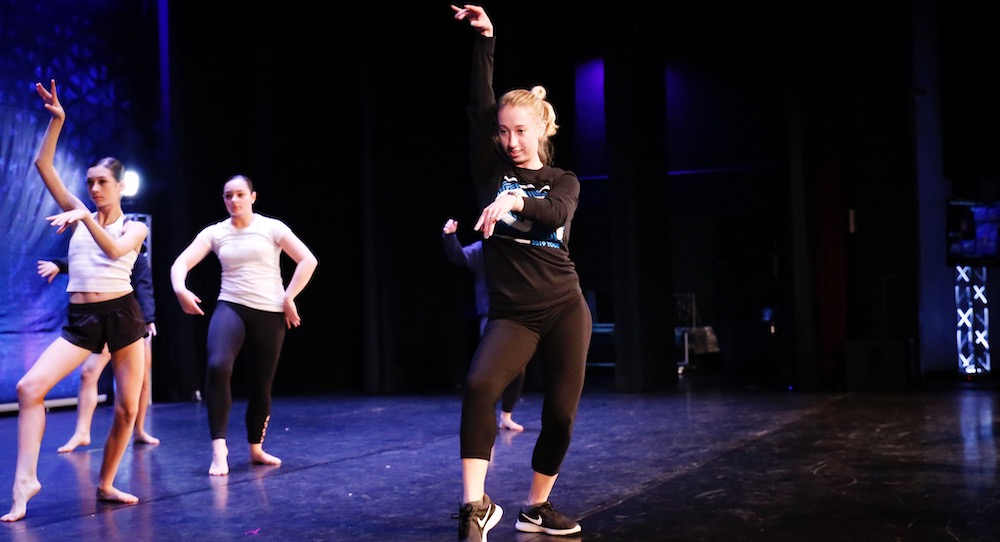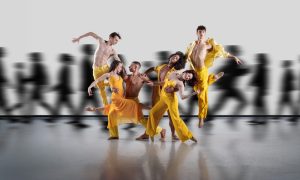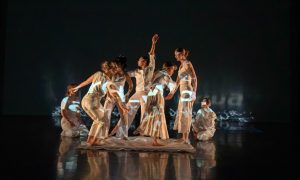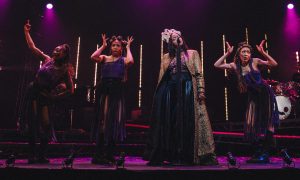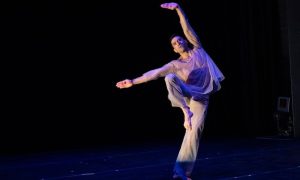It’s officially fall, and that reminds us of leaves changing color, pumpkin spice everything, Halloween, layers and a crisp breeze. But the word “fall” has another meaning, too, so we thought we’d use the time to address an important topic for dancers of all levels and ages – how to cope with a literal fall to the floor on stage.
Dancers are their number one worst critic. How many times have you been beyond frustrated with yourself if you’ve forgotten a step, fallen out of sync with the rest of your group in a performance or, our biggest nightmare, taken a spill on center stage? It’s a natural reaction to be bummed about such a flub, but it’s how we cope with that that’s the really important lesson.
Here, we turned to some teachers and judges with Groove Dance Competition and Convention, who’ve seen thousands of dancers perform in front of them, to see if they’ve ever stumbled on stage and also how dancers can turn their disappointment into a positive experience.
Have you ever fallen in any performances, competitions or important auditions?

Photo by Gabby Kirby.
Mallory Swanick, judge and convention teacher for Groove Dance Competition and Convention
“I’ve had two stage falls that come to mind. One was during a contemporary pointe performance. It was the first piece of the evening show, and the Marley had just been cleaned. One of my entrances called for sliding from stage right to stage left en pointe. I slid perfectly into a spot on the stage that hadn’t quite dried. I think my supporting knee hit the floor, but it happened so quickly that I don’t actually remember. I just continued with the remaining 15 minutes of the piece, luckily laughed it off with the choreographer, and now I make sure to fully scope out the stage before performing. The second fall that I can recall is from my days as a competitive dancer. I was competing one of my solos and realized mid-aerial that something about my transition into the aerial wasn’t right. I unintentionally made it an aerial to my knee. To this day, neither myself nor the choreographer know how I got back up. I remember feeling somewhat upset with myself, not because I fell but because I didn’t consciously make a decision on how to recover to standing in that moment. Needless to say, I practiced that transition plenty of times the following week.”
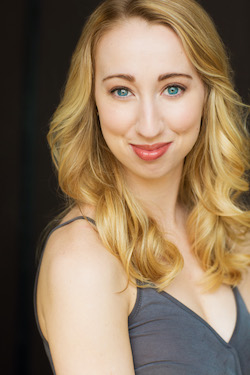
Photo by Elizabeth Wiseman.
Emma Gassett, dance educator and choreographer
“While performing as a member of the American Spirit Dance Company at Oklahoma City University, I fell out of an aerial during a performance. I remember feeling my left foot slip out from under me while lunging into the side aerial and thinking, ‘My momentum is off! I’m going to fall!’ Two seconds later, I felt pain in my right shin and kneecap as they slammed to the floor to catch my fall. It was a very humbling moment. I felt such shame for falling out of an acrobatic trick that I had performed hundreds of times before, especially since I was dancing professionally, and I was performing in front of an audience. But like anything else, the show must go on. So, I picked myself up off the floor and continued dancing until the number ended!”
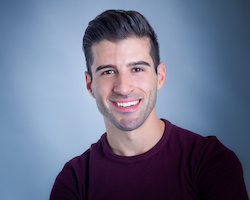
Anthony Raimondi, faculty member and judge for Groove Dance Competition and Convention
“I think like any live performer, I have had many random spills on stage, however none that stand out enough for me to dwell on. I do remember an incident of another performer falling when I was the dance captain for the National Tour of West Side Story. This performer had tripped over an upstage ground row during a portion of ‘Cool’, the Jets big dance number right when everyone was traveling downstage in unison. She was in the last line and had tripped behind the set piece and just waited there hidden until the group came back upstage together and popped up just in time to continue the next phrase with them. I remember this so vividly because it was so intelligently timed out so no one would notice her fall and was a completely split second decision on her part.”
Did you also ever fall out of time/sync during any performance or with the rest of your group on stage?
Raimondi
“Many times. In the moment, you feel so scared because you really think that all eyes are on you and you feel so vulnerable, but in reality no one knows what’s correct and what isn’t.”
Swanick
“I am sure I’ve fallen out of sync more times than I’ve realized, but I can’t recall a specific moment during a performance. I think each individual dancer has a general awareness when the timing of the group is off but do not always realize the extent to which it is off until they exit the stage, assess the performance and perhaps watch footage. I do have a number of backstage memories that include singing counts as a group, reviewing changes that impacted the counts, and reciting counts and corrections to teammates moments before walking on stage.”
Gassett
“One time while performing a small group lyrical routine entitled ‘Tribute to Our Heroes’ at a dance competition when I was about 10 years old, my brain ‘froze’. It was like time had stopped moving for me but continued moving for my fellow dancers on stage. My teammates were transitioning to a new formation, and I had no clue where I was supposed to travel for this new formation, even though I had performed and rehearsed this routine so many times before. Panic set in. Then, I took a deep breath on stage, saw where the other dancers had moved to, and moved into formation as quickly and discreetly as I could. I kept telling myself to not panic and get back in sync with my teammates as soon as I could.”
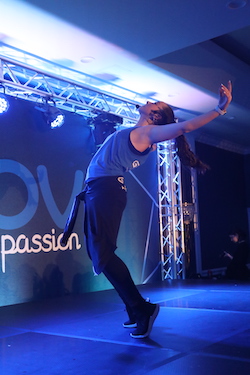
It’s easy for dancers to beat themselves up after things like messing up or falling on stage. What’s your advice to dancers for recovering from such a thing and not feeling so flat or disheartened?
Swanick
“Although a fall or mistake can be discouraging in the moment, realize that those moments do not define you as a dancer. Performances are wonderful in that they are a culmination of all the work you have put into your art. However, the process leading up to any performance – which includes your work ethic, focus, vulnerability and love for what you do – holds great value. If the process was rewarding and the time spent on stage (minus that split second when something maybe didn’t go as planned) was overall rewarding, then consider it a win. If you can learn from the experience, even better!”
Gassett
“Life is going to throw you curveballs, even when you’re on stage. We have no control over these ‘curveball moments’, but we do have control over how we respond to them. Try and remember to take deep breaths to clear your head after you’ve fallen or messed up choreography. Even though we strive for perfection in dance, mishaps will occur. Acknowledge that mishaps help shape us into becoming stronger, smarter and more determined dancers. It’s important to remember that we’re also human, so it’s okay to make mistakes.”
Raimondi
“My advice is that you cannot dwell in those moments or they will eat at your overall performance capability. As dancers, at least for myself, I feel that we are all trained to think we have to be so perfect, which is what makes us work so hard in the studio process, but live theater is never perfect. You will fall, you will mess up, you will be imperfect at times, but the only thing that will be noticed is how you recover. That girl from my story stood out to me because of how intelligent she was at recovering in the moment, not because she fell but because she was able to recover quickly and without despair.”
As a judge, how do you treat a dancer’s fall or mistake? Do you dock them points, bring it up in critique, offer encouraging words?
Raimondi
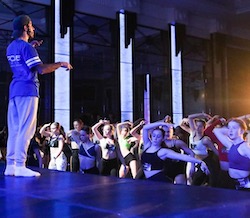
“I don’t really ever dock points for falling or mistakes made. I try to acknowledge it and maybe explain why they may have fallen and what can help for future performances but never dock points because of it. I think it’s important for us to learn as performers that the show will usually never stop, and we have to continue going no matter what. I think being able to recover from moments like that actually help show the judges your true capability as a performer, and for me, that is always reflected positively in my scoring.”
Swanick
“It’s all about the recovery for me. I don’t place a negative focus on a fall or a misstep, as dancers are constantly training and flukes happen. If I can offer feedback to help the dancer avoid similar occurrences in the future, that is where I will place my emphasis. Most of the time, falls result from the misuse of energy and force or from a technical flaw in the carrying out of a transition or skill. I will discuss and suggest hopefully helpful tips in my critique. If a dancer recovers quickly and carries on with the choreography, I will rightfully commend them. If a dancer needs to exit the stage due to injury, I will commend them for making a safe decision and offer some encouragement.”
Gassett
“When I see a dancer fall on stage, I tell them to get up as quickly as possible and keep pushing through the routine, unless he/she is hurt. Never sacrifice your health and safety to complete a routine. If you fall or make a mistake that causes extreme pain while on stage, please either exit the stage if you can, or just lay there until you can receive assistance. I never dock points for falling because anything can happen during a live performance. I encourage all dancers to continue dancing with full-out energy until the routine is over, unless badly injured.”
How can dancers turn a bummed-out moment like falling or messing up on stage into a positive experience, something to reflect on and learn from?
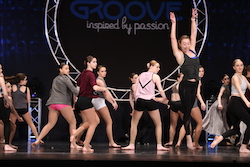
Groove Dance Competition and Convention.
Raimondi
“I think being able to correct yourself is an important lesson to learn in all this. Watch your videos, and learn from the mistakes that were made. Be open to fixing those mistakes. View your videos as a judge, and try to analyze yourself and where you may have gone wrong. I think this totally helps you develop the skill to self-correct in the moment and be one of those performers who can recover quickly and intelligently.”
Swanick
“View a fall or a mistake as a challenge. I once worked with a choreographer who told me I should aim to fall out of my pirouettes every single time. The one condition was that I was never allowed to fall in the same direction twice. There are 360 degrees in a full rotation and I had 360 direct points in which I could fall toward, but each time I fell I had to learn how to correct myself. The end goal of this challenge is to learn what it feels like to fall in every direction so that, as a result, you know what it feels like to be perfectly vertical and in line with your center of gravity. While I have yet to figure out how to fall out of a pirouette 360 different ways, the challenge serves as a reminder that falling is not something to be ashamed of. Falls and mistakes can inspire you to find new ways of working and improving. Each fall brings you one attempt closer to the goal that you want to accomplish.”
Gassett
“If you are bummed about falling or making a mistake on stage, use your frustration to fuel your training. Get back into the studio and rehearse the section you fell out of repeatedly. Be sure to cross-train to develop any muscle groups that can help control the section you fell out of. And always remember that everyone makes mistakes. You are not alone. Move forward, and choose to respond to your mistake with a positive outlook!
When life gives you lemons, make lemonade! If you make a mistake on stage, keep dancing! Half the time, the audience or judges might not even catch it! Don’t make a frustrated face or let the mistake bring your energy down. Keep persevering and finish your routine strong!”
By Laura Di Orio of Dance Informa.


